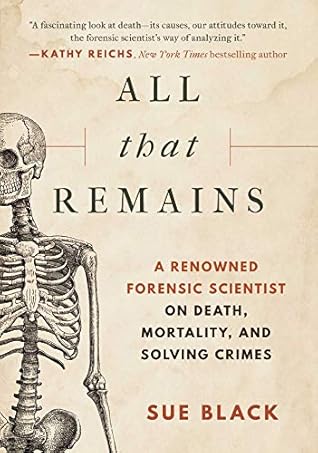More on this book
Community
Kindle Notes & Highlights
by
Sue Black
Read between
May 26 - June 4, 2023
‘Death is not the greatest loss in life. The greatest loss is what dies inside us while we live’ Norman Cousins political journalist (1915–1990)
there is no comfort to be had from soft words spoken at a safe distance.
Since we can’t influence the creation of our lives, and their end is unavoidable, perhaps we should be focusing on what we can regulate: our expectations of the distance between them. Perhaps it is this we should be trying to manage more effectively by measuring, acknowledging and celebrating its value rather than its duration.
‘Humans belong to the group of conscious beings that are carbon-based, solar system-dependent, limited in knowledge, prone to error and mortal.’
Remarkably, only five organs are considered vital to sustained life: the heart, brain, lungs, kidneys and liver.
The four permanent cell types are the neurons in our nervous system, a tiny little area of bone at the base of our skull called the otic capsule, the enamel in our teeth and the lenses in our eyes.
As the writer and scientist Isaac Asimov put it: ‘Life is pleasant, death is peaceful. It’s the transition that’s troublesome.’
‘The measure of life is not its duration, but its donation’ Peter Marshall pastor (1902–49)
The stark truth is, of course, that grief never dies. The American counsellor Lois Tonkin reminds us that loss isn’t something we ‘get over’, and it doesn’t necessarily lessen, either. It remains at the core of us and we just expand our lives around it, burying it deeper from the surface. So with time it may become more distant, more compartmentalised and therefore easier to manage, but it does not go away.
At what point does your death cease to matter personally to someone somewhere? In his poem ‘So Many Lengths of Time’, Brian Patten suggests that ‘a man lives for as long as we carry him inside us’, and that certainly strikes a chord with me. So often, as I grow older, I open my mouth and my father’s sayings fall out. We cannot die as long as there are people on earth who remember us.
A couple whose child disappeared once told me that it was as if their world had gone into a permanent stutter. While you are left replaying the same nightmare scenarios in your head in a continuous loop, you can never really begin to heal.
Now that I have less time in front of me than I have behind me, I am starting to focus on that threshold I must cross some time within the next thirty years. I am not afraid to cross it on my own. Indeed, I think I would rather die alone – privately, quietly, on my terms and at my pace. I don’t want to be distracted by having to worry about the pain and grief of my loved ones. I would like to ensure that I have all my ducks in a row. I don’t want to leave work or trouble for anyone else. I want it to be tidy and neat and the next logical step in my life. I don’t want to be any bother.


